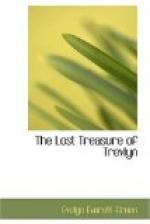As she stole down the staircase and stood before him with a wondering, questioning look in her big eyes, he eyed her keenly, and could not but see that some of the bloom had faded from her cheeks, and that she had in some way changed during the past months.
“Cherry,” he said, taking her small hand in his and speaking in an unwontedly gentle way, “has thy aunt told thee wherefore I want thee?”
“No, father; she said that thou wouldst tell me.”
“And so I will; but tell me first if there is aught amiss with thee. I have missed thy laugh of late, and thou hast lost some of thy roses. Does aught ail thee, child?”
Sudden tears welled up in Cherry’s eyes; her lip began to tremble.
“I know not, I know not,” she answered, with a little sob. “It only seems sometimes as though I could not bear the life any longer; it is all so drear, so dull, so dead! one day like another—always the same. Sometimes I think the narrow house will stifle me! O father, chide me not; I have struggled against the feeling, but the life is killing me! I know not how to bear it—alone.”
The last word was almost a whisper, and escaped Martin’s ears. He was regarding his child with a thoughtful and perplexed countenance. He fancied that he was somewhat in the position of a mother hen who sees its foster brood of ducklings take to the water for the first time. He did not understand this outburst in the least. Cherry’s restless discontent was an enigma to him. But he saw that it was real, and that it was a source of trouble and suffering to herself; and he wisely resolved neither to rebuke nor condemn her, but simply to treat it as the symptom of a malady of the body which might be cured by a few months’ change and relaxation.
The child was half frightened at her own boldness, and stood trembling before him, Her aunt would have boxed her ears and sent her to bed for such a confession; but her father only looked at her as though he were trying to read her very soul, and Cherry instinctively dropped her eyes, as if fearful that another secret would be read there—a secret which she kept locked up closely in her breast, and would not for the world that any other should know.
“Cherry,” said Martin Holt, speaking slowly and quietly, “I know not what to think of thy words, save that thy disordered fancies come from a disordered health. Thou hast been looking less robust than I like to see thee; wherefore I think it well that thou shouldest have some change in thy life, and see if that will cure thee. Thy good aunt Prudence Dyson, a younger sister of thy mother, has sent to ask me if I will spare her one of my daughters to help wait upon some young madams staying with my Lady Humbert. Thou hast not been brought up to such duties, but thou hast quick hands and eyes, and, I trust, a willing heart, and I have resolved to send thee. Thou wilt be in the country, and the change will doubtless be good for thee. I shall look




